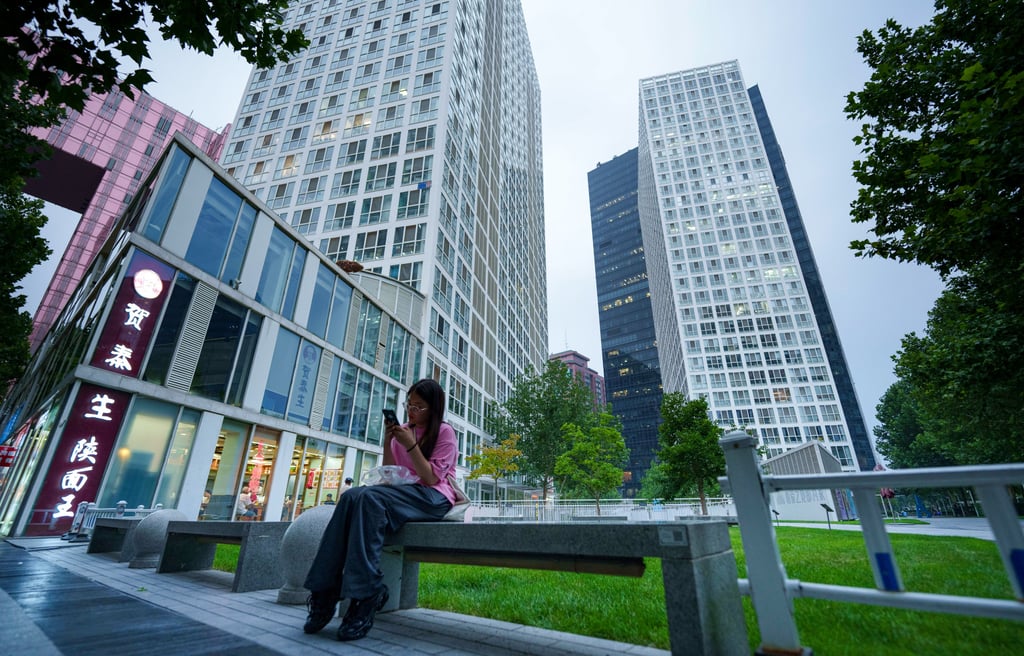“Office rents in the central business district have declined by 20 to 30 per cent from a year ago because the economy is bad, foreign-owned businesses are leaving, and businesses are [generally] struggling to stay afloat,” said Ma Xiaoyu, a Beijing-based real estate agent.
Landlords of office towers in the central business district experienced a surge in vacant spaces as major SOEs, like Sinochem Holdings and China Huaneng Group, have moved their headquarters to the Xiongan New Area, located about 100km southwest of the capital.
“Landlords are now offering substantial rent discounts and generous rent-free periods to retain tenants and fill the rising number of vacant spaces,” Ma said. “Since developers do not want their listing prices to appear too low, they are waiving rents for a few months to effectively lower the cost for tenants.”
Leading tech firms have also been moving their offices out of the city, further increasing vacancy rates. For example, Alibaba Group Holding recently relocated its Beijing headquarters to an industrial estate 22.5km outside the city centre, vacating more than 150,000 sq m of office space in Wangjing district. Alibaba owns the South China Morning Post.
As a result, the Wangjing and Jiuxianqiao districts in northeast Beijing, home to several major Chinese and international conglomerates, saw their vacancy rates jump by 2.2 percentage points quarter on quarter to 24.5 per cent in the three months to June, the highest in the city.
Samsung Tower, a 62-storey building in the central business district which has seen its vacancy rate rise to nearly 20 per cent, has reduced rents to 7.4 yuan per square metre per day, 18.7 per cent below the area’s average of 9.1 yuan per square metre per day, according to data provided by market insiders.
The tower, which houses the China headquarters of the namesake South Korean conglomerate, is also offering nine months of rent-free tenancy. This far exceeds the three to four months granted by its peers in the central business district in the hope of attracting tenants to fill 8,600 sq m of vacant space.
“The primary focus of competition among landlords is still pricing, as tenants are highly sensitive to rent levels in the current environment,” said Lu Ming, research director at Colliers North China.
“When vacancy rates remain elevated at over 20 per cent, it is challenging for rents to bottom out or stabilise,” he said. “The market still needs more time and patience for a recovery on the demand side.”
The relocation of SOEs from Beijing, aimed at reducing the city’s “noncore” functions, to the Xiongan New Area, has raised the area’s profile. The smart city was established in 2017 in northern Hebei province to accommodate big SOEs and serve as a nexus connecting the capital and nearby economies.
As of March this year, four SOEs, including Sinochem Holdings and China Huaneng Group, have registered their headquarters in Xiongan, according to data from Qichacha, a corporate registry.
Other state-backed conglomerates, including China Three Gorges Corp and China Electronics Corp have also moved their headquarters outside Beijing in recent years in response to the state-led relocation push.

“Beijing is traditionally a hub for government affairs and the headquarters of most state-owned firms, but that’s starting to change now,” said Yan Yuejin, director of E-house China Research and Development Institute. “Therefore, Beijing’s property market cannot be viewed solely from an economic perspective. You’ll have to factor in policy and politics as well.”
In the first half of 2024, leasing activity in Beijing’s office segment had improved from the same period last year, but it still fell short of anticipated recovery levels, according to Mi Yang, head of research for JLL North China.
“[Still], citywide rents are expected to further decline in the second half of 2024, while the vacancy rate in the grade A market is expected to remain stable,” said Mi, noting that a batch of rental leases are set to expire this year, which could potentially introduce demand to the market.
However, as China’s economic recovery remains on shaky ground and the office market still faces challenges, landlords will be prompted to offer more favourable terms to retain tenants.
“As rents persistently decrease, the price gap between various sub-markets and asset types is expected to narrow, intensifying competition across these categories” said Colliers’ Lu.
Current trends in market rents indicate that the overall office sector is shifting from localised rental battles to a broader, citywide price war, he added.
Large-scale departures from Beijing city centre leave gaping hole in office towers #Largescale #departures #Beijing #city #centre #leave #gaping #hole #office #towers
Source Link: https://www.scmp.com/business/banking-finance/article/3272057/large-scale-departures-beijing-city-centre-leave-gaping-hole-office-towers
Large-scale departures from Beijing city centre leave gaping hole in office towers:
“Office rents in the central business district have declined by 20 to 30 per cent from a year ago be…

